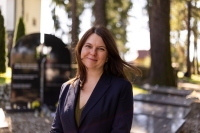
Sociologist
e-mail: karolina.panz@ispan.edu.pl
ORCID: https://orcid.org/0000-0003-2019-7624
Academia.edu: https://pan-pl.academia.edu/KarolinaPanz
Research interests
- Jewish life and Holocaust in Polish province
- Polish-Jewish reations
- microhistory
- smuggling networks
- borderlands
Photo: Maciej Jaźwiecki.
Membership in scientific bodies
- member of Polish Center for Holocaust Research
Awards and honors
- 2024: POLIN Award Honorable Mention for her efforts to restore the memory of Podhale Jews
- 2023: The “Protecting Memory” decoration of merit for saving Jewish heritage
- 2022: The Jan Boniecki Polcul Foundation Award for social activities related to the subject of scientific research and courage in raising difficult historical topics
- 2022: The Fr. Stanisław Musiał Award for her work promoting the spirit of Christian-Jewish and Polish-Jewish dialogue and cooperation
- 2021: First prize for PhD dissertation in the IX edition of the Majer Bałaban Competition for the best doctoral dissertation on a Jewish subject
- 2021: First prize for PhD dissertation in the VIII edition of the Inka Brodzka-Wald Competition for the best doctoral dissertation on present issues
- 2016: the inaugural Israel Gutman Award, presented by the Polish Center for Holocaust Research, for the best research paper on the Holocaust and Polish – Jewish relations
Scholarships
- 2024/2025: Claims Conference Saul Kagan Fellow in Advanced Shoah Studies Cohort XVII
Research projects
- since 2024 principle investigator in “Faces of smuggling in the Polish-Slovak borderland between 1918 and 1949” NCN Sonata-19 project
- 2019–2024: co-investigator in “The Kraków Pogrom of 11 August 1945 against the Comparative Background” (supervised by prof. dr hab. Joanna Tokarska-Bakir)
- 2018: investigator in project “Networks in the Holocaust” conducted by The Center for Research on the Holocaust in Poland and Yad Vashem
- 2015–2018: investigator in research project “Jewish Survival Strategies in Occupied Poland 1939–1945. Studies of Selected Counties” conducted by the Polish Center for Holocaust Research
- 2014–2019: investigator in project “The social anthropology of absence – Poland and Ukraine after the Second World War” (supervised by Anna Wylegała PhD)
- 2014–2016: investigator in project Obertyn, „Обертин, אָבערטין – opowieści o życiu miasteczka [stories on the town life]” conducted by Ośrodek Pamięć i Przyszłość in Wroclaw
Publications
- Panz, Karolina (2023). “The Poles Are Taking Over All of Rabka”: A Microhistory of Ethnic Cleansing. In Anna Wylegała, Sabina Rutar and Małgorzata Łukianow (Eds.), No Neighbors’ Lands in Postwar Europe. Vanishing Others (pp. 51–73), Palgrave Macmillan.
- Panz, Karolina (2022). Rescue and Smuggling Networks in the Polish-Slovak Borderland during the Holocaust. In Eliyana R. Adler and Natalia Aleksiun (Eds.), Entanglements of War: Social Networks during the Holocaust (pp. 103–158), Jerusalem: Yad Vashem.
- Panz, Karolina (2022). Nowy Targ County. In Jan Grabowski and Barbara Engelking (Eds.), Night without End. The Fate of Jews in German-Occupied Poland (pp. 295–348), Bloomington: Indiana University Press.
- Panz, Karolina (2019). Comment échapper à la mort? Le cas des Juifs de la region de Nowy Targ. In Audrey Kichelewski, Judith Lyon-Caen, Jean Charles Szurek and Annette Wieviorka (Eds.), Les Polonais et la Shoah (pp. 105–116), Paris: CNRS Éditions.
- Panz, Karolina (2018).“The children are in a state of true panic” Postwar Anti-Jewish Violence in Podhale and Its Youngest Victims. Yad Vashem Studies, 46(1), 103–140.
- Panz, Karolina (2018). Powiat nowotarski. In Barbara Engelking and Jan Grabowski (Eds.), DALEJ JEST NOC. Losy Żydów w wybranych powiatach okupowanej Polski (pp. 213–358). Warszawa: Stowarzyszenie Centrum Badań nad Zagładą Żydów.
- Panz, Karolina (2018). „To już nie jest szczyt tylko głupoty, to jest podłość i zdrada” – ruch Goralenvolk a zagłada podhalańskich Żydów. In Alicja Bartuś (Ed.), Jak się rodzi zło. Sprawcy, wykonawcy, pomocnicy (pp. 123–140). Oświęcim: Państwowe Muzeum Auschwitz-Birkenau, Fundacja na Rzecz MSDM.
- Panz, Karolina (2018). Testimonies of Survivors of Postwar Anti-Jewish Violence: Deconstructing a Myth of Polish Collective Memory. Societas/Communitas. Semi-Annual Journal of Institute of Applied Social Scienses University of Warsaw, 151–164.
- Panz, Karolina (2017). „To było w okresie żniw” – pamięć polskich świadków Zagłady w Kreis Neumarkt. In Alicja Bartuś (Ed.), Świadkowie: między ofiarą a sprawcą zbrodni (pp. 123–140). Oświęcim: Państwowe Muzeum Auschwitz-Birkenau, Fundacja na Rzecz MSDM.
- Panz, Karolina (2017). The Fate of Jewish Orphans in Podhale, 1945– In Henning Borggräfe, Akim Jah, Nina Ritz oraz Steffen Jost (Eds.), International Tracing Service Yearbook, vol 6, Freilegungen, Rebuilding Lives – Child Survivors and DP Children in the Aftermath of the Holocaust and Forced Labor (pp. 93–104). Gottingen: Wallstein Verlag.
- Panz, Karolina (2015). “Why Did They, Who Had Suffered So Much and Endured, Have to Die?”: The Jewish victims of armed violence in Podhale (1945–1947). Holocaust Studies and Materials. Journal of the Polish Center for Holocaust Research 2017 2019.
- Panz, Karolina (2014). “Singerowie mieli sklep…”. Historia pewnej rodziny i jej mienia. In Jan Grabowski oraz Dariusz Libionka (Eds.), Klucze i kasa. O mieniu żydowskim w Polsce pod okupacją niemiecką i we wczesnych latach powojennych 1939–1950 (pp. 299–336). Warszawa: Stowarzyszenie Centrum Badań nad Zagładą Żydów.
- Panz, Karolina (2014). Żydowscy mieszkańcy Nowego Targu – historia Zagłady. Studia żydowskie. Almanach, no. 4, 77–96.
- Panz, Karolina (2007). Zagłada sztetl Gritze. Zagłada Żydów. Studia i Materiały, no. 3, 15–41.